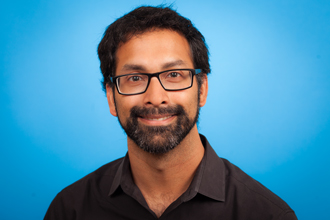Patients are open to being asked about sexual orientation and gender identity, study suggests

By Kim Barnhardt, CMAJ

Dr. Andrew Pinto
Patients are open to being asked about their sexual orientation and gender identity in primary care, which can help make health care more welcoming, although the stage should be set for these questions and they should include a range of options, found a study published in CMAJ (Canadian Medical Association Journal).
“Understanding the social determinants of health, including gender identity and sexual orientation, is important for providing better health care as these are linked with outcomes,” says Dr. Andrew Pinto scientist at The Upstream Lab of St. Michael’s Hospital. “Many transgender and gender-diverse people have negative experiences in health care that affect their health.”
During the study, conducted at the St. Michael’s Hospital Academic Family Health Team between Dec. 1, 2013 and March 31, 2016, researchers asked questions on sexual orientation and gender identity. They offered a survey to 15,221 patients, of whom 14,247 responded to at least one question. Of these, over 90 per cent answered questions about sexual orientation and gender identity. They also interviewed 27 patients of diverse age, gender identity, education level, language and immigration status to fully understand their reactions to these questions. Several themes emerged:
- Patients appreciated the variety of options on the surveys to indicate gender identity and sexual orientation
- Some LGBTQ2S (lesbian, gay, bisexual, transgender, queer, two-spirited) patients were uncomfortable answering the questions as they recalled previous negative experiences because of gender or sexual orientation. Some cisgender and heterosexual patients were also uncomfortable.
- Despite a variety of responses provided on the survey, some patients did not see their identities reflected and suggested additional terms to include in future surveys.
“Our findings can inform health-care organizations that wish to characterize their patients through routine collection of sociodemographic data,” says Dr. Pinto. “Questions on gender identity and sexual orientation should include a range of flexible response options and definitions for clarity.”
These papers are an example of how St. Michael’s Hospital is making Ontario Healthier, Wealthier, Smarter.
About St. Michael’s Hospital
St. Michael’s Hospital provides compassionate care to all who enter its doors. The hospital also provides outstanding medical education to future health care professionals in more than 29 academic disciplines. Critical care and trauma, heart disease, neurosurgery, diabetes, cancer care, care of the homeless and global health are among the Hospital’s recognized areas of expertise. Through the Keenan Research Centre and the Li Ka Shing International Healthcare Education Centre, which make up the Li Ka Shing Knowledge Institute, research and education at St. Michael’s Hospital are recognized and make an impact around the world. Founded in 1892, the hospital is fully affiliated with the University of Toronto.
About Unity Health Toronto
Unity Health Toronto, comprised of Providence Healthcare, St. Joseph’s Health Centre and St. Michael’s Hospital, works to advance the health of everyone in our urban communities and beyond. Our health network serves patients, residents and clients across the full spectrum of care, spanning primary care, secondary community care, tertiary and quaternary care services to post-acute through rehabilitation, palliative care and long-term care, while investing in world-class research and education. For more information, visit www.unityhealth.to.
